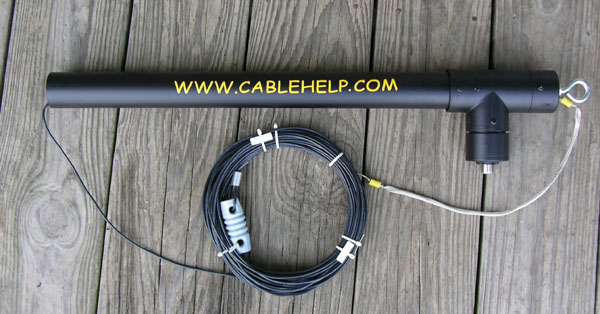
Antenna manufacturing & design
Antennas for limited spaces
Cablehelp.com
Antenna manufacturing & design
Antennas for limited spaces
Home of the rugged 160 Meter "sloper" antenna!
Want on 160M but cramped for antenna
space? We have your solution:
If you have 40-50' height and about 50' horizontal space
we have a great antenna to get you on the air. We offer a 75/80M
version as well.
Thanks to all who came by and saw us in Pontotoc at the Papa Jack's Trade Day event. We had a great time. Next hamfest: Minden, LA Dec 06! Come see us!
Check out this video from Memphis:
With snow flurries already and winter just around the corner, it's time to start prepping for cold weather. When the snow and ice is deep on the ground is not the time to be repairing antennas! Take a little time now to give everything in your antenna farm a good visual. Checking for corrosion or water ingress now can pay big dividends later on. Check the tension and condition of guy wires on towers and look for corroded connectors everywhere. If you fihd something that makes you uneasy climbing your tower, then DON'T. Find another way to rectify the situation. It isn't worth your life or a serious injury...
The finest shortened 160M antenna available at any price!
Click here for more info
We also offer an 80 Meter version.

Our world famous 160M sloper is now in 59 countries,
But Proudly Made in America for 18 years!
***We also build custom antennas for VHF and UHF.. contact us for a quote on your special antenna... problem antenna situations are our specialty...***
We have plans to introduce a shortened, loaded dipole for 160M soon. It's been in Beta testing for more than a year now with great results. It is more narrowbanded than our sloper but with a decent tuner still covers the entire band. The tip-to-tip length is about 120 feet. Not bad for a 160M wire!
Antenna 101: Over time we get many requests for advice and other questions about antennas. We are always happy to help. One question keeps coming up. "I have always been told that when operating an antenna on a band other than the one it was designed for, I need to keep the power down...why?" Keep in mind that many antennas are designed for a single-band (or a limited number of bands). These antennas are resonant in those band(s). If operated on another band it is likely NOT resonant. Take a dipole for instance. At the feedpoint (at resonance) there is very little voltage but a high current flow is present. This allows a lot of power to be fed into the dipole without damage. The high-voltage points in this antenna are at the ends of the radiator wires where the circuit is open. On a band where it is not resonant high-swr values will occur and very high voltages will develop both in the transmission line and the antenna. If these voltages find even the slightest path to arc, such as a dirty insulator or a carbon trail where lightning has arced before, catastrophic results can happen. This arcing can damage your radio/amplifier. Keep in mind that using a good wide-range tuner allows us to operate antennas in a lot of situations where we really shouldn't. However the tuner does not do anything for the antenna. It just makes the radio/amplifier happy by giving it a 50 ohm load to operate into. The radio might be "happy" but the antenna could be on the verge of failure at the same time. It will be just as mis-matched as before with respect to the signal driving it. You can burn up most any antenna or BALUN (even 1500 watt baluns) by driving them hard with an amp and forcing them to operate into loads not resonant on the operating frequency.
© 2002 thru
2025 Stan Jones
KC5UYF
//
From n3kl.org
Satellite info links:
© 2002/2025 Cablehelp.com
For more info call: 662 332 8454
snail mail:
Questions/comments: stanj6@suddenlink.net
page last updated 10/18/2025
| ||||||||